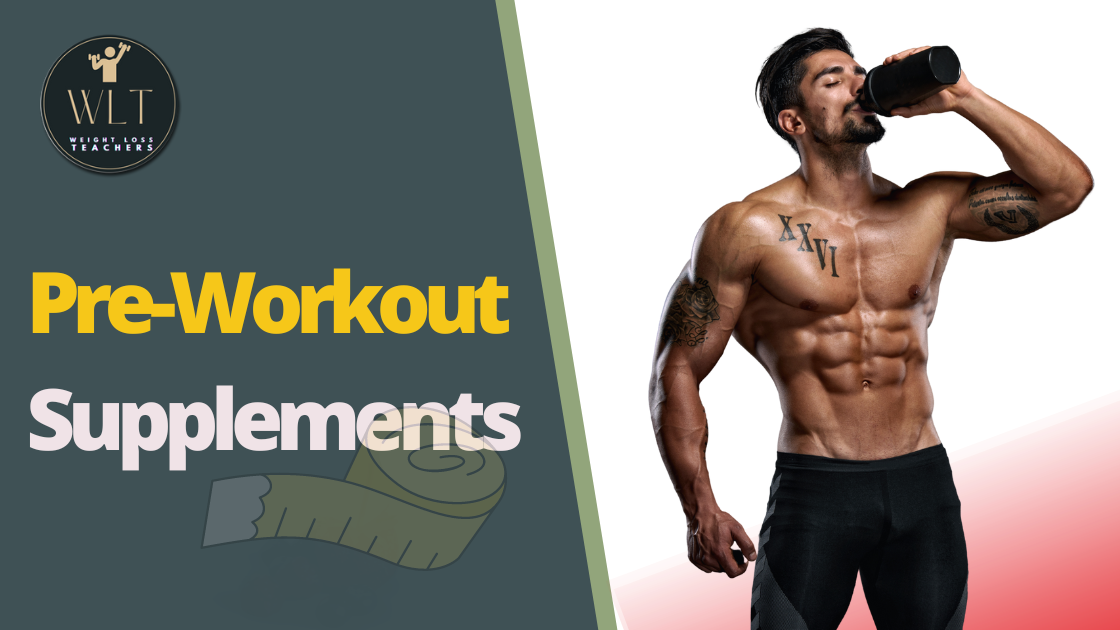
Pre-Workout Supplements
Pre-workout supplements have become increasingly popular among fitness enthusiasts over the years. These supplements are designed to improve performance during exercise by providing the body with essential nutrients and energy.
Curious about pre-workout supplements and their effects on your fitness routine? Pre-workout supplements are designed to enhance your exercise performance by increasing energy, endurance, and focus. They can be a valuable addition to your fitness regimen, helping you push through intense workouts and achieve your fitness goals faster. However, it’s important to choose the right supplement and understand its ingredients. Learn about the benefits, key ingredients, and considerations for selecting the best pre-workout supplement for your needs. Get ready to take your workouts to the next level!
Table of Contents
What are Pre-Workout Supplements?

Pre-workout supplements are nutritional supplements that are designed to be taken before exercise. They are formulated to provide the body with the energy and nutrients it needs to perform at its best during a workout. Pre-workout supplements can come in different forms, such as powders, capsules, or drinks, and can contain a variety of ingredients.
Here’s an overview of pre-workout supplements in tabular form:
| Supplement | Description | Benefits |
|---|---|---|
| Caffeine | A stimulant commonly found in coffee and energy drinks. | Increases alertness, improves focus, enhances endurance, and delays fatigue. |
| Creatine | A compound that helps supply energy to muscles. | Increases strength, power output, and muscle mass. |
| Beta-Alanine | An amino acid that helps buffer acid in muscles. | Improves muscular endurance and reduces fatigue. |
| Branched-Chain Amino Acids (BCAAs) | Essential amino acids (leucine, isoleucine, valine) that support muscle protein synthesis. | Reduces muscle soreness, prevents muscle breakdown, and promotes recovery. |
| Nitric Oxide Boosters (e.g., L-Arginine, L-Citrulline) | Compounds that increase blood flow to muscles. | Enhances muscle pump, improves nutrient delivery, and increases exercise performance. |
| Betaine | A compound that supports muscle protein synthesis and hydration. | Improves power output, strength, and muscle endurance. |
| Taurine | An amino acid that supports neurological function and muscle contraction. | Reduces muscle cramps, improves endurance, and supports recovery. |
| Tyrosine | An amino acid that helps produce neurotransmitters. | Enhances focus, mental clarity, and reduces stress during exercise. |
| Electrolytes | Minerals like sodium, potassium, and magnesium that support hydration. | Prevents dehydration, maintains muscle function, and reduces cramping. |
| Vitamins (e.g., B Vitamins) | Essential nutrients that support energy production and overall health. | Boosts energy levels, supports metabolism, and enhances overall workout performance. |
Pre-workout supplements can help enhance workout performance, increase energy levels, and support muscle growth and recovery.
The primary goal of pre-workout supplements is to increase energy levels, improve focus, and enhance endurance. They are also believed to help with muscle growth and recovery, reduce muscle fatigue, and increase strength. Pre-workout supplements are commonly used by athletes, bodybuilders, and fitness enthusiasts to help them achieve their fitness goals.
Benefits of Pre-Workout Supplements

Pre-workout supplements have emerged as a popular option for individuals aiming to enhance their workout experience. These supplements offer a range of benefits that cater to the diverse needs of fitness enthusiasts. From increased energy and improved focus to enhanced endurance, muscle growth, and reduced muscle fatigue, pre-workout supplements have become a cornerstone of many fitness routines.
Increased Energy: Igniting the Workout Fire
Arguably one of the most immediate and noticeable benefits of pre-workout supplements is the surge in energy they provide. Designed to fuel the body’s demands during intense physical activity, pre-workout supplements often contain caffeine—an effective stimulant known to increase energy levels and sharpen mental focus. Caffeine acts as a natural energizer by targeting the central nervous system, resulting in heightened alertness and reduced perception of fatigue. As a result, individuals who incorporate pre-workout supplements into their routines often experience improved motivation and the ability to initiate and maintain high-intensity workouts.
Improved Focus: Sharpening Cognitive Acuity
The journey towards fitness excellence extends beyond physical prowess; mental focus plays an equally vital role. Pre-workout supplements capitalize on this principle by incorporating ingredients like caffeine and other stimulants that enhance cognitive function. The heightened mental alertness and improved concentration provided by these supplements enable users to stay dialed into their workouts, helping them maintain proper form, technique, and goal-oriented execution. Enhanced focus not only aids in achieving better results but also contributes to the overall safety of workouts, reducing the risk of injuries caused by distraction.
Enhanced Endurance: Pushing Boundaries Further
Endurance is the backbone of any successful workout routine, and pre-workout supplements excel in supporting this facet of fitness. Ingredients such as beta-alanine, commonly found in these supplements, work to delay the onset of muscle fatigue. By increasing the body’s levels of carnosine—a compound responsible for buffering lactic acid accumulation—beta-alanine enables athletes to engage in prolonged, high-intensity activities. This increased endurance is particularly advantageous for endurance sports, such as long-distance running or cycling, as it allows athletes to push their limits and reach new performance plateaus.
Muscle Growth and Recovery: Building and Repairing
The pursuit of muscle growth and swift recovery is a shared goal among fitness enthusiasts. Pre-workout supplements contribute to these aspirations by incorporating ingredients that facilitate muscle development and repair. Creatine, a well-known component of many pre-workout formulas, aids in increasing muscle mass and strength by promoting the synthesis of adenosine triphosphate (ATP)—the primary energy currency of cells. Additionally, branched-chain amino acids (BCAAs) found in pre-workout supplements play a crucial role in muscle recovery. BCAAs help reduce muscle protein breakdown during exercise, promoting a favorable environment for muscle repair and growth post-workout.
Reduced Muscle Fatigue: Prolonging Peak Performance
Muscle fatigue is a formidable adversary that can hinder workout performance and limit progression. Pre-workout supplements leverage ingredients such as beta-alanine and citrulline malate to combat muscle fatigue effectively. By increasing the body’s capacity to buffer acid build-up and enhance blood flow, these ingredients delay the onset of fatigue, allowing individuals to sustain high-intensity efforts for longer durations. The reduced perception of fatigue empowers athletes to break through performance barriers and explore their physical limits, ultimately leading to more productive training sessions.
How Do Pre-Workout Supplements Work?

Pre-workout supplements work by providing the body with essential nutrients and energy needed to perform at its best during a workout. They contain a variety of ingredients that work together to improve energy levels, focus, endurance, and muscle growth and recovery.
One of the key ingredients found in many pre-workout supplements is caffeine. Caffeine is a stimulant that can help increase energy levels and improve mental focus. It can also help increase the metabolism, allowing the body to burn more calories during exercise.
Here’s a summary of how pre-workout supplements work in tabular form:
| Supplement | Mechanism of Action |
|---|---|
| Caffeine | Blocks adenosine receptors to reduce fatigue and increase alertness; stimulates central nervous system for enhanced focus and energy. |
| Creatine | Increases phosphocreatine stores in muscles, which helps produce more ATP (energy) during high-intensity exercise. |
| Beta-Alanine | Increases levels of carnosine in muscles, buffering acid and reducing fatigue during intense exercise. |
| BCAAs (Branched-Chain Amino Acids) | Promote muscle protein synthesis and reduce protein breakdown during exercise, helping prevent muscle fatigue and soreness. |
| Nitric Oxide Boosters (e.g., L-Arginine, L-Citrulline) | Increase nitric oxide production, leading to vasodilation, improved blood flow, and enhanced nutrient delivery to muscles. |
| Betaine | Supports cellular hydration and osmotic balance, improving power output and muscle endurance. |
| Taurine | Stabilizes cell membranes and regulates calcium signaling, aiding muscle contraction and reducing exercise-induced muscle damage. |
| Tyrosine | Precursor to neurotransmitters like dopamine and norepinephrine, enhancing mental performance and reducing stress during exercise. |
| Electrolytes | Maintain fluid balance, prevent dehydration, and support muscle function by replenishing minerals lost through sweat. |
| Vitamins (e.g., B Vitamins) | Assist in energy metabolism by converting food into usable energy, supporting overall physical performance. |
Pre-workout supplements aim to enhance physical and mental performance during exercise, increase energy levels, improve endurance, and support muscle function and recovery.
Another common ingredient found in pre-workout supplements is beta-alanine. Beta-alanine is an amino acid that can help increase muscle endurance and reduce muscle fatigue. It works by increasing the levels of carnosine in the muscles, which can help delay muscle fatigue during exercise.
Creatine is another popular ingredient found in many pre-workout supplements. Creatine is an amino acid that can help increase muscle mass and strength. It works by providing the muscles with energy during exercise, allowing users to push through their workouts for longer periods.
Other common ingredients found in pre-workout supplements include BCAAs, citrulline malate, and nitric oxide boosters. BCAAs are amino acids that can help promote muscle recovery and reduce muscle soreness. Citrulline malate is an amino acid that can help increase blood flow and improve endurance. Nitric oxide boosters, such as arginine, can help increase blood flow to the muscles, which can improve endurance and reduce fatigue.
Overall, pre-workout supplements work by providing the body with the essential nutrients and energy needed to perform at its best during a workout. They contain a variety of ingredients that work together to improve energy levels, focus, endurance, and muscle growth and recovery.
Unlocking Performance: A Deep Dive into the Common Ingredients Found in Pre-Workout Supplements

The pursuit of peak physical performance and the desire to optimize workout sessions have led to the rise in popularity of pre-workout supplements. These formulations, carefully crafted to enhance energy, endurance, and recovery, owe their efficacy to a blend of potent ingredients that cater to the needs of athletes and fitness enthusiasts. In this exploration, we delve into the science behind the common ingredients found in pre-workout supplements, shedding light on their mechanisms and the benefits they bring to the table.
Caffeine: Energizing the Drive
Caffeine, the universally cherished wakefulness-promoting compound, takes a center stage in many pre-workout supplements. As a central nervous system stimulant, caffeine works by blocking adenosine receptors. Adenosine is a neurotransmitter responsible for signaling sleepiness and relaxation. By impeding its action, caffeine instigates a surge of neural activity, resulting in heightened alertness, improved mood, and reduced perception of fatigue. This dual-action of increasing energy levels and enhancing mental focus proves invaluable during intense workouts, allowing individuals to maintain their vigor and determination throughout their sessions.
Beta-Alanine: The Endurance Enhancer
Beta-alanine, an amino acid naturally found in the body, plays a pivotal role in elevating muscle endurance and mitigating muscle fatigue. It functions by increasing the levels of carnosine—a dipeptide composed of beta-alanine and histidine—within the muscles. Carnosine acts as a buffer against the accumulation of lactic acid, a byproduct of intense exercise that contributes to the burning sensation experienced during workouts. By delaying the increase in acidity in muscles, beta-alanine effectively extends the time until fatigue sets in, enabling individuals to push their limits and achieve more during their training.
“The food you eat can be either the safest and most powerful form of medicine or the slowest form of poison.” – Ann Wigmore
Creatine: Powering Performance
Widely recognized for its muscle-enhancing properties, creatine is an amino acid derivative that fuels explosive energy requirements. During high-intensity activities, creatine rapidly replenishes adenosine triphosphate (ATP)—the cellular energy currency—allowing muscles to contract with greater force and for more extended periods. This surge in energy translates to enhanced workout performance, enabling users to tackle intense exercises head-on. Moreover, creatine’s role in facilitating cellular hydration contributes to improved muscle cell volume and nutrient transport, further promoting muscle growth and recovery post-exercise.
BCAAs: Recovery’s Cornerstone
Branched-chain amino acids (BCAAs) encompass three essential amino acids—leucine, isoleucine, and valine—that hold the key to efficient muscle recovery and growth. During exercise, BCAAs are metabolized in the muscles, helping to prevent the breakdown of muscle protein and encouraging protein synthesis. Leucine, in particular, takes the lead by initiating the mTOR pathway, a crucial driver of muscle protein synthesis. By supplementing with BCAAs, individuals foster an environment conducive to muscle repair, reducing muscle soreness and expediting the recovery process.
Citrulline Malate: Powering Blood Flow and Stamina
Citrulline malate, a combination of the amino acid citrulline and malic acid, shines as a versatile ingredient in pre-workout supplements. Its primary role revolves around improving blood flow and endurance. By increasing the production of nitric oxide, citrulline malate triggers vasodilation—the expansion of blood vessels—which enhances blood circulation and oxygen delivery to working muscles. This heightened oxygen supply, combined with the elimination of waste products, supports sustained physical effort and mitigates the onset of muscle fatigue.
Nitric Oxide Boosters: Amplifying Blood Flow
Nitric oxide boosters, exemplified by compounds like arginine, share a common objective with citrulline malate: boosting blood flow to the muscles. Arginine, an amino acid, serves as a precursor to nitric oxide production. By dilating blood vessels, these boosters enhance the delivery of oxygen and nutrients to muscles, consequently improving endurance and combating fatigue. The synergistic effect of these boosters with other ingredients in pre-workout supplements amplifies their overall impact on performance.
Taurine: Balancing Focus and Fatigue
Taurine, an amino acid with multifaceted benefits, contributes to the cognitive and physical aspects of exercise. In the brain, taurine enhances the levels of neurotransmitters like dopamine and serotonin, fostering improved mood and mental focus. This augmented cognitive acuity can enhance motivation and determination during workouts. On the physical front, taurine supports endurance by aiding in the regulation of calcium levels within muscle cells, promoting efficient muscle contractions and overall performance. Additionally, its anti-oxidative properties contribute to reducing exercise-induced muscle damage and soreness.
Navigating the Caveats: Understanding the Potential Side Effects of Pre-Workout Supplements

In the world of fitness and exercise, pre-workout supplements have emerged as potent tools for enhancing energy, focus, and performance. However, like any dietary intervention, these supplements are not without their caveats. While they offer a plethora of benefits, it’s crucial to acknowledge and comprehend the potential side effects that can arise from their use. Here, we delve into the common side effects associated with pre-workout supplements, empowering users to make informed decisions about their fitness regimen.
Jitters and Nervousness: The Caffeine Quandary
A cornerstone ingredient in many pre-workout formulations, caffeine delivers an energizing kick that propels users into their workouts with heightened alertness. However, this very attribute can also lead to a downside—jitters and nervousness. Sensitivity to caffeine varies widely among individuals, and for some, even a moderate dose can trigger feelings of restlessness and unease. To mitigate this potential side effect, individuals who are sensitive to caffeine should opt for supplements with lower caffeine content or consider caffeine-free alternatives, ensuring that the benefits of increased energy are enjoyed without the accompanying discomfort.
Insomnia: The Sleep Disruptor
While pre-workout supplements are designed to ignite energy and focus during the day, their stimulant content can inadvertently disrupt sleep patterns. Caffeine and other stimulants, taken too close to bedtime, can interfere with the body’s ability to wind down for restorative sleep, potentially leading to insomnia. To circumvent this issue, it’s advisable to time supplement consumption earlier in the day, allowing the stimulants to be metabolized before bedtime and ensuring a good night’s sleep.
Digestive Issues: The Gastric Challenge
Digestive woes, including bloating, gas, and diarrhea, can arise as side effects of pre-workout supplements. These issues often stem from the presence of high doses of caffeine, creatine, or other stimulants, which can impact the digestive system’s regular functioning. Staying within recommended dosage limits and staying well-hydrated can help alleviate the risk of these side effects. Drinking ample water not only aids in the absorption of the supplements but also supports healthy digestion, reducing the likelihood of gastrointestinal discomfort.
Headaches: The Caffeine Conundrum Continues
Headaches can be an unwelcome consequence of pre-workout supplement consumption, particularly when supplements contain high doses of caffeine or other stimulants. These compounds can trigger constriction and dilation of blood vessels, potentially leading to headaches, especially in those susceptible to such effects. Opting for supplements with moderate caffeine content and ensuring proper hydration can serve as preventive measures against this side effect.
Elevated Heart Rate and Blood Pressure: Caution for Cardiac Health
Individuals with pre-existing heart conditions or cardiovascular vulnerabilities need to exercise caution when considering pre-workout supplements. Stimulants like caffeine can elevate heart rate and blood pressure, potentially posing risks for those with compromised cardiac health. Consulting a healthcare provider before integrating such supplements into one’s routine is crucial, as medical guidance can ensure safe usage and reduce the chances of adverse cardiovascular effects.
Allergic Reactions: The Unforeseen Response
As with any dietary supplement, allergic reactions can occur due to individual sensitivities to specific ingredients. Allergic responses may manifest as hives, rashes, itching, or even difficulty breathing. If these symptoms arise after consuming a pre-workout supplement, it’s imperative to seek medical attention promptly. Identifying the source of the allergic reaction and avoiding the offending ingredient in the future is essential for user safety.
Note: There might be affiliate links mentioned here. We may receive a commission if you purchase a product through an affiliate link. There is no additional charge for you. Please do your own research before making any online purchases.
Conclusion
Pre-workout supplements can provide numerous benefits for individuals looking to improve their performance in the gym. They can help increase energy levels, improve focus, increase endurance, and promote muscle growth and recovery. However, it is important to choose a pre-workout supplement that contains safe and effective ingredients and to follow the recommended dosage to avoid potential side effects.
Individuals with pre-existing medical conditions or those who are sensitive to caffeine or other stimulants should speak with a healthcare provider before taking pre-workout supplements. It is also important to maintain a healthy diet and exercise regimen in conjunction with the use of pre-workout supplements to achieve the best results.
FAQs (Frequently Asked Questions)
Q1: What are pre-workout supplements?
A1: Pre-workout supplements are specially formulated nutritional products designed to be taken before exercise. They provide essential nutrients and energy to enhance workout performance, often coming in forms like powders, capsules, or drinks. Their primary aim is to boost energy levels, improve focus, enhance endurance, promote muscle growth and recovery, and reduce muscle fatigue, making them popular among fitness enthusiasts.
Q2: What benefits do pre-workout supplements offer?
A2: Pre-workout supplements offer a range of benefits, including increased energy, improved focus, enhanced endurance, muscle growth, and reduced muscle fatigue. These benefits are achieved through a combination of ingredients like caffeine, beta-alanine, creatine, BCAAs, and citrulline malate, each catering to specific aspects of performance enhancement.
Q3: How does caffeine in pre-workout supplements work?
A3: Caffeine, a common ingredient in pre-workout supplements, acts as a central nervous system stimulant. By blocking adenosine receptors, caffeine increases alertness, reduces fatigue perception, and enhances energy levels. This helps users maintain motivation and focus during workouts, translating to improved overall performance.
Q4: What is beta-alanine’s role in pre-workout supplements?
A4: Beta-alanine is an amino acid that boosts muscle endurance and mitigates muscle fatigue. It elevates carnosine levels in muscles, which buffers against lactic acid accumulation, delaying the onset of fatigue. This enables users to engage in high-intensity exercises for longer periods, ultimately enhancing workout endurance.
Q5: How does creatine contribute to pre-workout supplement effectiveness?
A5: Creatine is an amino acid that rapidly replenishes ATP, the cellular energy currency, during high-intensity activities. This leads to enhanced muscle contraction force and duration, aiding in workout performance. Additionally, creatine promotes cellular hydration, contributing to muscle growth and post-exercise recovery.
Q6: Why are BCAAs significant in pre-workout supplements?
A6: Branched-chain amino acids (BCAAs) aid in muscle recovery and growth. They prevent muscle protein breakdown during exercise and stimulate protein synthesis, particularly leucine, which initiates muscle protein synthesis. This promotes muscle repair, reduces soreness, and accelerates recovery after workouts.
Q7: How does citrulline malate enhance workout performance?
A7: Citrulline malate increases blood flow by elevating nitric oxide levels. This vasodilation enhances oxygen and nutrient delivery to muscles, delaying fatigue and boosting endurance. The improved blood circulation also aids in waste removal, further supporting sustained physical effort.
Q8: Can pre-workout supplements cause side effects?
A8: Yes, pre-workout supplements can have potential side effects. Common side effects include jitters, nervousness, insomnia, digestive issues (like bloating and gas), headaches, elevated heart rate, high blood pressure, and allergic reactions. Sensitivity to ingredients like caffeine varies, making it important to choose supplements that align with individual tolerances and health considerations.
Q9: How can I prevent side effects from pre-workout supplements?
A9: To minimize side effects, consider several measures: choose supplements with moderate caffeine content, time consumption earlier in the day to avoid disrupting sleep, adhere to recommended dosage guidelines, stay well-hydrated to mitigate digestive issues, and consult a healthcare provider if you have pre-existing heart conditions or allergies.
Q10: Can I use pre-workout supplements if I have allergies?
A10: Pre-workout supplements can potentially trigger allergic reactions in some individuals due to specific ingredients. Symptoms may include hives, rashes, itching, or difficulty breathing. If you experience any of these symptoms after taking a supplement, seek medical attention immediately. Identifying the allergen and avoiding it in the future is crucial for your safety and well-being.
Disclaimer: The information provided in this article is for educational purposes only and should not be considered as a substitute for medical advice. Consult a healthcare professional before implementing any home remedies or making significant changes to your lifestyle.







